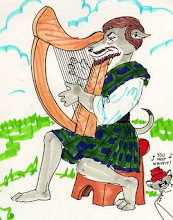First let me say that my French is very rusty. But I remembered enough to understand the gist of it. And when I read the following I was definitely intrigued. Since the traditional "English Greyhound" was so well known, I would hazard a guess that this may well refer to a whippet, or the dog that became the whippet that we know of today.
Buffon la mentionne et le Dictionnaire de chasse et de pesche (1769) nous donne sur elle le renseignement suivant qui montre qu'on l'employait chez nous à courre le lapin :
Le petit lévrier d'Angleterre. On choisit les plus hauts pour courir le lapin dans une garenne ou dans quelque lieu clos; on les y tient en laisse proche une des épinières faites exprès et qui sont éloignées des trous où les lapins se retirent étant hors de terre. Si on veut faire courir le petit lévrier, on bat les épinières, le lapin sort, il veut regagner son trou, mais il se trouve barré et souvent pris parle lévrier. (T. I, p. 86.)
Heather Jean Dansereau asked her neighbor who returned this translation:
Buffon mentioned the following information in the Dictionary of hunting and fishing (1769) on how one hunts rabbits at their location:
One often chooses the largest to run rabbit from a rabbit warren or some enclosed space; one holds them there on a leash near one of the especially made Pine Tree Barrier and which are away from the holes where the rabbits hide underground. If one wants to make the small Rabbit run, one hits the Pine Trees, the rabbit then leaves, it will go back to its hole, but it finds itself prevented and then is taken by the small greyhound.
Animaux de sport: lévries-taureaux-coqs
By Jacques Boulenger, Émile Henriot
Published by P. Lafitte & cie, 1912
Sunday, March 1, 2009
Subscribe to:
Post Comments (Atom)




No comments:
Post a Comment